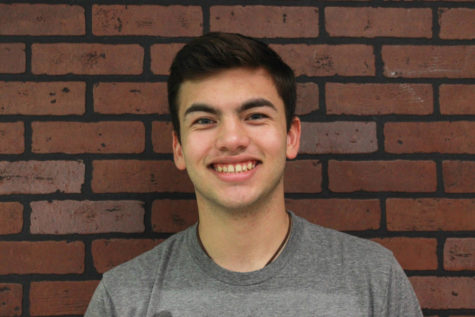He’s the voice of the announcements. The one who leads the pep rallies. The one who enforces “On a lanyard, around your neck.” The one who says, “It’s a great day to be a Marauder.”He’s full of energy. His face is red when he hypes up students. He’s a funny guy. He’s the voice of the announcements. The one who leads the pep rallies. The one who enforces “On a lanyard, around your neck.” The one who says, “It’s a great day to be a Marauder.” He’s full of energy. His face is red when he hypes up students. He’s a funny guy.
His job is the same this year as it was last year, assistant principal. The people around him are the same. But his body is changed. His lifestyle is changed. He is changed.
• • •
Jason Mullin has always been a bigger kid, and his peers noticed. They picked on Mullin because he was chunky and slow — an easy target. At recess they chased him on the playground. They threw things at him. They punched him. He was active and involved in sports just like them. He didn’t want to be big, but they bullied him anyway. Kids pestered him throughout middle school and into high school. But he learned to deflect it.
There’s an old stereotype that the fat kid’s the funny one. Mullin owned this niche. He’s always been a smart alec making self-deprecating jokes. “If I’m making the ‘fat’ joke and I’m the ‘fat’ kid, then they’re going to laugh with me,” Mullin said. “But they’re not going to be calling me fat.”
• • •
In college, Mullin was still a big guy with broad shoulders and a barrel chest. He was able to somewhat manage his weight through athletics, but after college, his metabolism dropped, and he continued to eat the same way a teenage boy does. As the years went on, he packed on more and more pounds. He loves sweets. In fact, he loves food in general except veggies. He loves pasta and hated lettuce. He loves pizza but not broccoli. And he loves burgers, so he ate them meal after meal after meal.
At times he tried to believe his weight wasn’t there. He blocked it out.
Other times he told himself he had a choice. He could lose weight, but he didn’t have to.
Doctors told him he was still healthy, but it would be nice if he lost a couple of pounds. A few times he tried to lose weight and to go on a healthy diet. Then he had one cheat day. Then another. It turned into a cycle. When he woke up early to work out, he decided to sleep in. When he planned a healthy meal, he later decided to go out to lunch.
• • •
Years later Mullin noticed he was having trouble reading. He had sharp eyesight his entire life, so it must be an effect of getting older, he thought. He went to the pharmacy to pick up a cheap pair of reading glasses. They helped for a few days until his eyesight became even worse. So he got stronger lenses. And then stronger. And stronger.
In about a week and a half, Mullin went from perfect vision to being almost unable to drive. It seemed like it happened overnight. He also realized he could no longer zip around school like before. When he finished climbing stairs, he was out of breath. When he walked around the hallways, he had to take breaks.
• • •
Mullin had learned to hide his weight from others and from himself. It wasn’t too hard in the cooler months — just throw on a hoodie or jacket. But now his weight stared him right in the face. He sat paralyzed thinking about the blood sugar test he’d just taken. The years of eating junk food, of drinking three to four Dr. Peppers a day, of little or no exercise had come to this. The blood sugar test came back at 375, four times above the normal amount. He had decided to borrow his friend’s glucometer after telling attendance clerk Trudy York about his loss of eyesight. She knew exactly what it could mean. Diabetes. And if his blood sugar had been any higher, Mullin could have fallen into a coma or even died.
Back in his office, he tried to bring some of his usual humor to the situation.
“Is that high?” Mullin jokingly asked York.
“Only if you don’t want to keep living,” York said.
• • •
After speaking to his wife, Mullin immediately made an appointment with the family doctor. “If you don’t fix this, you’re going to have diabetes, and you’re going to have to take insulin every day,” the doctor said. “You’re going to have medical problems.”
That was Mullin’s first slap in the face from reality. “I don’t want to die,” Mullin said. “I don’t want to be sick. I don’t want to have to go to the doctor once a month and take medicine and take drugs.”
He thought about his two kids. Both teenage boys, 15 and 12, who loved outdoor activities. The past few years he hadn’t been able to be active with them, and if his life continued the way it was, he might miss out on the rest of their childhoods.
So on Nov. 3, 2016 Mullin decided that something must change. He cut all the junk food, sodas and unnecessary things out of his diet. He got back in the gym and played basketball three to four times a week.
• • •
Environmental science teacher Adam Hovde weighed 314 pounds at 5 ft., 7 in. When he graduated college, he weighed 160. He didn’t exercise, and he ate terribly. Pizza. Pasta. Bread. Hovde was tired all the time. His blood pressure high. Triglycerides high. Cholesterol high. The sleep apnea he had his entire life was worse. When he was younger there were so many things he could do that he couldn’t do now. He couldn’t kayak. He couldn’t mountainbike. He couldn’t go out and throw a ball with his 11-year-old son anymore.
In May 2016, Hovde’s wife had an inverted sleeve surgery, and she lost weight and felt better overall. Hovde wanted that too. A joking and sarcastic guy, Hovde wasn’t the kind to sulk about his weight. But he realized he only had so many years with his son before he headed off to college. If he wanted to be there for his kid, he had to lose weight.
“It took me changing my body and changing my outlook… to where I was able to change most of these things about my life,” Hovde said.
So in July 2016, Hovde decided to take a different path to weight loss. Unlike Mullin, he chose the inverted sleeve surgery that brought his wife so much success. It took many tests, doctors appointments and a three week liquid diet before, Hovde had the inverted sleeve surgery in February 2017.
Surgeons reduced his stomach from the size of a football to the size of a banana. After surgery, he removed all junk food and sodas from his diet. He ditched carbs and restricted his meat consumption. He drank a protein shake every morning and had small snacks throughout the day like greek yogurt and nuts. He went to the gym multiple times a week and even did a ropes course last summer — something he could have never done just a year prior.
• • •
Both men have seen massive success since beginning their weight loss. In almost 12 months, Mullin has lost 75 pounds, and he feels more alive, more willing to joke and relax — like a bag of bricks was taken off his back.
“The job hasn’t changed. The family hasn’t changed. But I’ve changed,” Mullin said.
It would be easy for him to blame his old weight on someone or something else, Mullin said. Instead, he chooses to own up to his personal choices. “I was okay admitting it was my fault, that I did it to myself. It was really cool eating McDonald’s for breakfast, Whataburger for lunch and Chipotle for dinner every day for three weeks straight,” Mullin said. “But really and truly the bottom line is I did that to myself.”
Mullins says that teachers, friends and family members have all complimented him on his weight loss. He’s grateful, but it reminds him of his old body. “I think I can probably count on one hand the number of times I’ve been in somebody’s picture in the last five years,” Mullin said.
What haunts him most are his old pictures. When he sees the pictures, he’s grateful that he stuck with the change but regretful and angry that it took him so long. He worries that while he was struggling with his weight, his sons’ childhoods were flying by, and he wasn’t the role model he wanted to be.
“I’m hoping that I did not miss much of my two sons’ teenage years,” Mullin said. “That’s the bigger thing — hoping I didn’t screw it up and ruin their lives because of how I was handling my life.”
In the last nine months, Hovde has lost 100 pounds. He’s able to live life more fully, but it required a complete 180 degree lifestyle turn.
However, memories of the past have not yet left Hovde either. “I still see myself as overweight,” Hovde said. “When I look in the mirror I still see that guy with 100 more pounds on him. I still consider myself obesely overweight because that’s the way I’ve been for the last 14 or 15 years. I can’t get away from it now.”
Hovde believes it will take several years to overcome the way he sees his body. He plans to lose 20-25 more pounds, but his health is radically better. For the first time since college, he’s under 200 pounds.
Hovde and Mullin are both open to sharing their experiences with students. Hovde hopes to inspire overweight kids who’ve given up on trying to lose weight. “I was in my lifestyle for a very long time, and I was able to change it and get healthier,” Hovde said. “If I’m able to do that after 20 years of living a crappy lifestyle, I think others can do it too.” The best thing Mullin hopes he can teach his sons and others through his experience is humility — humility to admit not everything is okay.
“It’s okay to say I’ve got a problem,” Mullin said. “I was stupid, and I let that get in the way. And I’m glad I fixed it.”








Angenette Fudala • Nov 11, 2017 at 4:30 PM
Great job on this story, kiddo! Your writing style really brings both of these men’s stories to life.